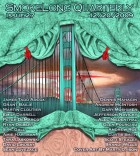I love stories that feature running in one form or the other, and this one is extremely cool. Thanks for sending it to SmokeLong! (You might also want to check out “The Runner” by Curtis Smith in the same issue). Anyway: That ending. We discussed it quite a bit, and some of us felt that it came too much out of nowhere, and others, myself included, agreed, but thought that this was precisely the reason it worked. Would you like to comment on why you chose this particular type of ending with its sudden shift in perspective?
Given that the title of the piece is “Heavenward”, I feel like the reader might be expecting that at some point in the piece there could be a death. I am not, as a nontheist, particularly interested in the concept of an afterlife, but I do think about the daily possibility of my own death. This ending is how I imagine it might play out. The notion of being thrust outside the framework of time, with all the time in the (after)world to reflect. That conceptual paradox.
“There was no great mystery waiting to be solved or explained. Just Jogging Freak.” I don’t believe the narrator. I think there is some mystery, despite all of his careful, detached, dismissive explanations—something I can’t put my fingers on. Do you have any idea what it could be?
The mystery is a general one: what, if anything, motivates compulsive behavior in people? The story is an allegory for a strong personal sense of compulsion (the exact nature of which I’m not going to delve into). And then there’s the essential mystery of “How deeply can we ever understand another human being?” “Not very” being my conclusion, although the inquiry is of value.
Whenever I read a story about running (or even one that isn’t necessarily “about” running, but that alludes to it in ways that feel significant to me), I’m wondering what attracted the writer to the topic of running. This was the case with this story as well. So, what attracted you to the topic of running?
I was a tennis player in my teens, very athletic, and my sister was the runner. My father was both. So I grew up with the culture of running and of athletic pursuit. Running is a very lyrical thing. It’s solitary, and therefore mysterious. How well can one really know a runner? There’s something compelling about people who choose running as a pastime.
“The Unicorn”—this image leapt out at me. I wondered whether this was a nod to the venerable Boston Marathon (the symbol of the Boston Athletic Association and the Boston Marathon is a unicorn. Or did you think of something else entirely? Unicorns are, of course, very symbolic animals.
I wasn’t aware of the Boston Marathon symbol. I first came up with the head-mounted flashlight (are there such things?), and then pictured how that would look at night. I did worry that it was over-symbolic—our popular culture is pretty over-saturated with unicorn imagery—but I figured, well, that’s how it would look. I liked the idea of someone designated as a freak transforming into a sort of iconic symbolic figure.


